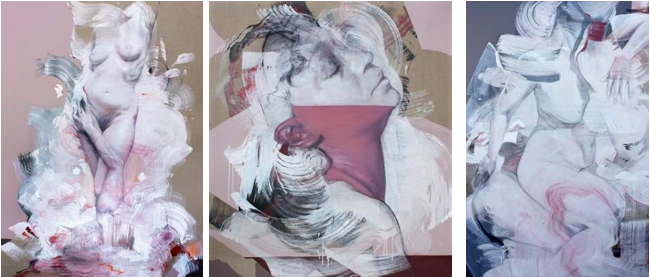
Daughters of Medusa
FONTAINE-WOLF BREAKS TABOOS ABOUT MENSTRUATION AND EXPLORES SOCIETY’S DEPICTIONS OF WOMEN AS MONSTROUS OR PURE
To mark Menstrual Hygiene Day on 28 May and raise funds for Bloody Good Period, Zebra One Gallery will unveil acclaimed artist, Rebecca Fontaine-Wolf’s brave and beautiful show, Daughters of Medusa, at Old Street Gallery - it explores the mythology of strong and “fearsome” women, whose powers must be contained and aims to break taboos about menstruation.

The exhibition features bold, figurative paintings of women - both selfportraits and subjects Rebecca knows - inspired by the mythological characterisation of women’s cycles, as well as personal stories and experiences.
She explains: “Medusa is a symbol of woman as the other. Beautiful and pure on the one side and monstrous on the other.
“This image exists in many different forms and is one we’ve carried culturally for millennia. It still shapes our views of womanhood and is inextricably linked with menstruation; the inherent ability to hold the cycle of life and death within oneself.”
The power of the female gaze - which plays such a vital part in the story of Medusa - serves as one of the main focuses for the series of paintings. Even in Medieval times, it was believed that a glance from a menstruating or menopausal woman had the power to poison, or even kill. This illustrates the immense threat perceived not only from women’s menstrual blood, but also from female power itself, which still exists in many forms today.
Daughters of Medusa reflects on the positive power and creative potential present in this primal aspect of womanhood, which is still veiled in fear and shame today. The mixed emotions most women in today’s society still have towards their bodies and themselves, especially on those thresholds of change during the menarche and menopause, exemplify Medusa’s legacy.
Rebecca was fascinated by the many negative and disturbed reactions she had from female viewers for washing the lower half of her painting of Venus in red paint, considering Venus is a goddess of desire, sex and fertility of which lifeblood is an essential element.
She also happened upon Muslim women on social media discussing the challenges around eating while having their periods during Ramadan - they aren’t supposed to fast during the holy month if this is the case, but many are too ashamed to be open about not fasting in front of male relatives.
Then a friend told Rebecca about her daughter’s anxieties around her first period and the negative ideas she had about ‘the curse’, which made Rebecca contemplate why this topic is still such a taboo, and most importantly, why it’s still only associated with discomfort and inconvenience. Something shameful at worst; embarrassing at best, but rarely regarded as positive.
The exhibition will raise funds for Bloody Good Period, which aims to end period poverty by providing products and menstrual education and will take place on Menstrual Hygiene Day, encouraging people to break the taboo around periods.
She adds: “This seems especially ironic given that society is still so focused on women’s fertility. As every childless woman over 30 knows, the question as to when you will have kids arises frequently, even from strangers, with an implied expectation that you should fulfil your biological destiny before it’s too late. Yet the most vital ingredient in being able to bear children is still something people are uncomfortable talking about.”
Multi-award-winning artist, Rebecca was featured as one of the winners of BBC art programme Show me the Monet in 2011 and went on to become Vice President to the Society of Women Artists, founded in 1857, where she takes on a curatorial role. She has exhibited widely as a solo artist; curated and judged group shows and her work can be found in both public and private collections.
Contacts